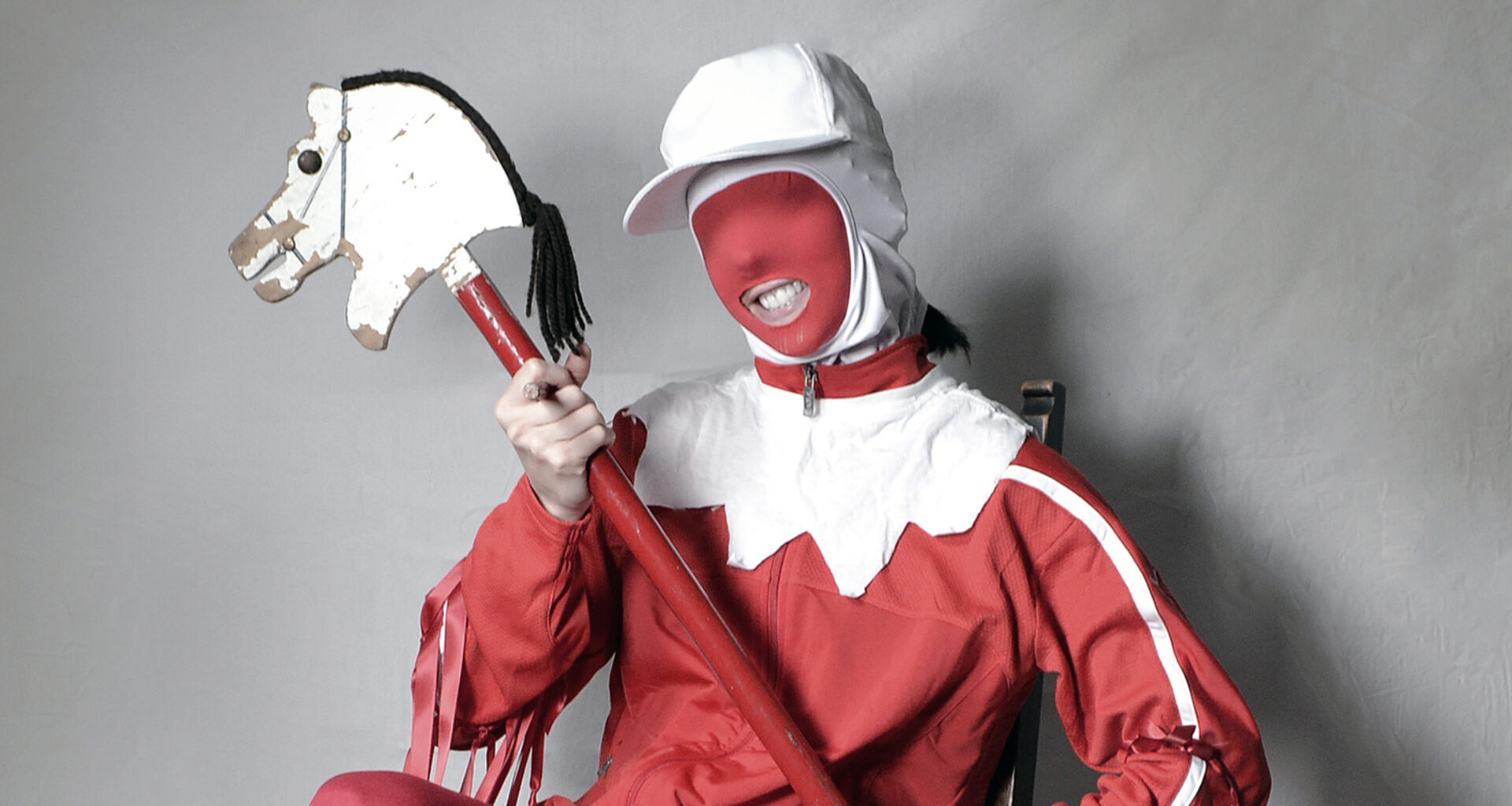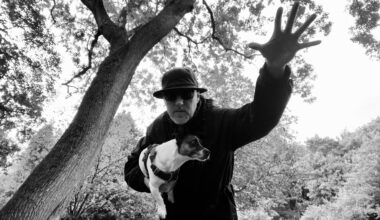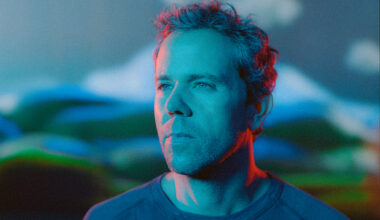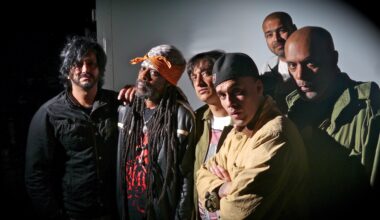Before leaving the EU was a thing, Elizabeth Bernholz relocated from metropolitan Brighton to the soon-to-be “Vote Leave” climate of the Lincolnshire flatlands. The culture shock is still sinking in for Gazelle Twin, whose new ‘Pastoral’ album is an unsettling tour de force
Something is rotten in the heart of Middle England on Gazelle Twin’s magnificent new electro-gothic album, ‘Pastoral’. A richly layered state-of-the-nation epic, Elizabeth Bernholz’s latest conceptual creation is her most ambitious and novelistic work yet, spanning the sonic spectrum from nightmarish lullabies to industrial techno-punk bangers. Steeped in historical echoes, yet fiercely contemporary, this folk-horror masterpiece takes place in an eerie twilight zone where ‘The Archers’ meets ‘Twin Peaks’.
Narrated by a multiplicity of heavily treated character voices, all of them Bernholz, ‘Pastoral’ is a bold attempt to probe the raw psychic wounds of Britain’s Brexit-voting heartlands. Along the way it invokes Chaucer and Blake, JG Ballard and PJ Harvey, ‘Straw Dogs’ and ‘The Wicker Man’.
The album was partly triggered by Bernholz’s growing alarm at the “stealth fascism” behind the current resurgence in English nationalism, as well as mounting anxiety over her place in this increasingly fractured, politically polarised climate.
“There are songs where I’m definitely attacking the crassness of nationalism and tabloids,” says Bernholz. “A lot of it is quite literal. But other stuff is maybe more from my perspective, my social status, my age, my circumstances in life. Stuff about growing up in this time.It is a bit of landscape of my own identity, with a backdrop of what’s going on now.”
Bernholz is speaking down the line from her rural farmhouse in the dark heart of Brexitland. Four years ago, she and her musician husband Jez Bernholz, who also performs live as an auxiliary member of Gazelle Twin, relocated from Brighton to the wide-open flatlands between Nottingham and Grantham. Their original plan was to use her sister’s place as a temporary base while the band was touring. But following the birth of their son Ezra, the couple ended up staying in the East Midlands. The culture shock is still sinking in.
“There is no Waitrose!” she says. “We have to go to Newark for Waitrose. It’s a shock to the system. The landscape, the community, the voting public, it’s all a complete polar opposite to where we were in Brighton.
Actually we were both really scared, but we did think it would be a good test of our identity, to figure out what we could do without. We are still going through that process, and having a kid adjusts everything again.”
Ezra’s birth coincided with the Brexit referendum, which cast the couple’s new rustic idyll in a more sinister light. The Leave result certainly caught Bernholz by surprise.
“I’m probably speaking from the infamous bubble, but a lot of people I know felt that Brexit kind of came out of nowhere,” she says. “Their parents and friends voted for Brexit and all of a sudden we were like, ‘How did that happen?’.”
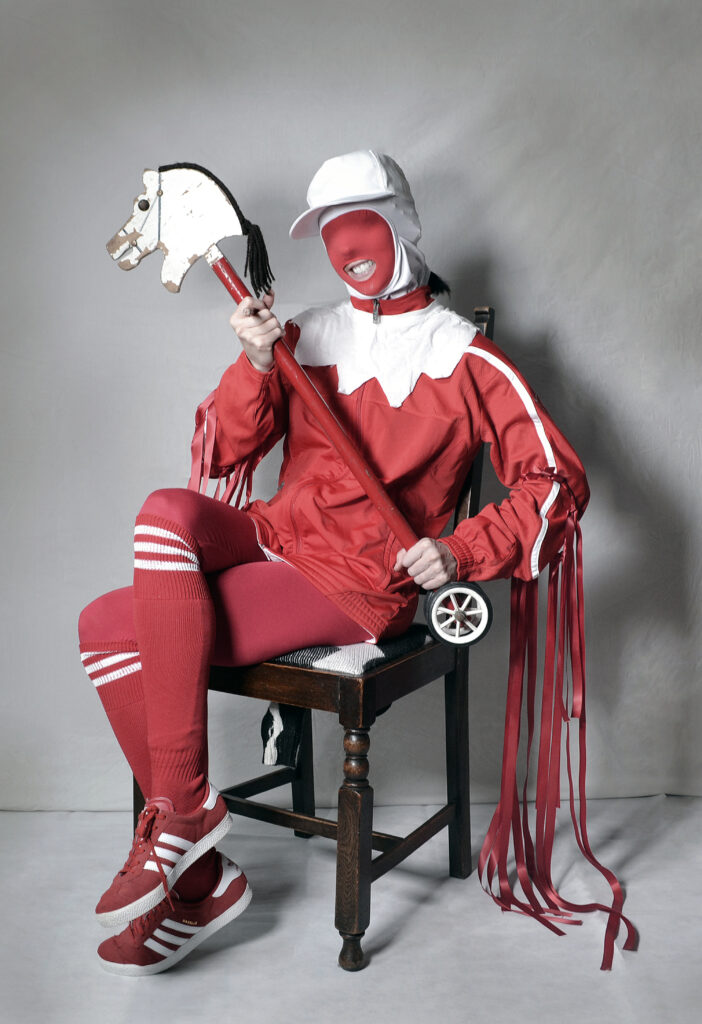
But the intense, nerve-shredding emotions that run through ‘Pastoral’ are not purely a reaction to external political events. New motherhood has also been stressful for Bernholz, who suffered post-natal depression after Ezra was born. These domestic horrors only seemed to amplify the wider national mood swings, which were also feverish and turbulent.
“Definitely,” says Bernholz. “That’s not my theme, but it was my mood. Making the album and performing it live is all channelling a lot of stress and unsettled madness. It is just like a mirror for what is going on outside, this weird union of circumstances coming together. It’s weird, because life has become more aggressive, more frightening, more intense. It should be the opposite when you move somewhere quiet. It is quite a lonely existence having a kid anyway, but then living in a really quiet place, all the details start to reveal themselves and you tune into things that are quite dark. I mean, I do that anyway, but having a kid just adds another layer.”
Bernholz says she has always lived with anxiety and depression, but it is only recently that she has begun to use music itself as a form of therapy.
“I need to have a reason to get onstage and square up to people, to get a lot of my own aggression and emotion out,” she says. “And I do have a lot, ha! I have more than the average person, which comes with its own weariness eventually. And psychotherapy and stuff like that helps.”
She is just about to start a “really juicy course of therapy” called EMDR (eye movement desensitisation and reprocessing), a controversial technique which is typically used to treat post-traumatic stress disorder.
“It’s about going into your rapid eye movement stage so you’re lucid dreaming, going back to memories and reprocessing them,” says Bernholz, “which I’m scared about, but also quite excited too, because that is weirdly kind of what I do when I’m performing. I love to channel all that energy and just chuck it out there.”
The classically-trained Bernholz wrote her first “bleak, Portishead-inspired” tracks on a cheap Yamaha synth aged 15. She slowly refined her manifesto, and began making fiercely beautiful avant-noise music as Gazelle Twin around the dawn of this decade. She has also remained resolutely independent, self-releasing on her boutique imprint, Anti-Ghost Moon Ray. Despite heaps of critical acclaim, her meetings with hip electronic labels have mostly proven “frustrating and soul destroying”.
After a lengthy spell balancing Gazelle Twin with part-time jobs, Bernholz has finally begun to make a living from music in the last couple of years. She now seems unflustered that her intense, discordant, challenging work has proven too left-field for even the most adventurous electronic labels.
“Luckily I don’t have to worry about that as much now,” she shrugs. “At the point I actually stopped caring about stuff like that, I made better work.”
Bernholz chose her cryptic stage alias from an incomplete anagram of her maiden name, Elizabeth Walling, but the Gazelle Twin persona also serves as a useful mask, allowing her to immerse herself in a series of visually striking, androgynous, creepy alter egos. Blurred gender and dislocated identity have been recurring themes in her work, most notably on her terrific 2014 album ‘Unflesh’, which remixed her traumatic adolescence into a kind of seething, feral, body-horror exorcism. The effect, she says, was cathartic.
“’Unflesh’ opened the floodgates for me, in a really good way,” says Bernholz. “In a shocking way initially, because I had buried a lot of those memories, and then I found I had come out about suicidal tendencies and my whole childhood and puberty. I’d spent so much of life hiding all that, running away from shame, I just decided, now I’m going to face it full frontal and head-on. And that’s been my philosophy since. Also, musically, ‘Unflesh’ tapped into a sort of creative palette that I didn’t want to let go of too soon, so when it came to ‘Pastoral’ I tried to start where I’d left off. There was a lot of aggression and electricity that I just wanted to take to a new place.”
‘Pastoral’ certainly feels like a more expansive sequel to ‘Unflesh’, seething with disgust and beauty, sex and danger.
“After ‘Unflesh’ I wanted to do something that was more of a comment on society and my own position within that,” she says. “But then it very quickly became about my own English identity, and England, and Britain, and this crazy period that we’ve suddenly reached very quickly of just total madness.”
The deep past hangs heavy over ‘Pastoral’. Living in a rural backwater surrounded by Civil War battle sites and quaint villages, Bernholz has been struck by how “vile and bloody history” inevitably becomes a twee tourist landmark.
“It’s impossible to engage with what’s going on now without engaging with our last 500 years of history at least,” she says. “You see how things are happening again, just with different costumes and different voices.”
Costumes and voices are certainly key elements on the new record. Like all Gazelle Twin’s work, it is an audio-visual project with its own signature characters and vivid colour scheme. Bernholz was first inspired to adopt a masked alter ago after seeing Fever Ray play the Loop Festival in 2009. Performing under a different identity, she explains, is more liberating than limiting.
“I think I should have been an actor,” says Bernholz. “I need those devices to just keep my own interest, but also to keep me able to communicate what I want to be able to communicate. It works because it has changed over time. Initially it was a very simple choice just to remove myself from the issues I had with performing live as a female, as somebody who isn’t a caricature of a rock star. There’s a lot of pressure to be a certain way, and I’m talking about the pressure I put on myself as well. So I thought, if it’s just not me, then I don’t really need to think about it and I can take this anywhere I want.”
On her previous albums, ‘The Entire City’ and ‘Unflesh’, Bernholz designed distinct visual identities. Over time, she resolved to create a different “protagonist” for each new project.
“I try to keep it quite specific to the needs of what I’m writing,” she says, “but also something that I can identify with as well, something that isn’t completely kooky just for the sake of it. Like the ‘Unflesh’ costume ended up just being my PE kit from school because the record was about puberty and a very specific moment in my life. It was kind of like self-therapy. I felt like that was the costume of my demon and I wanted to just become that.”
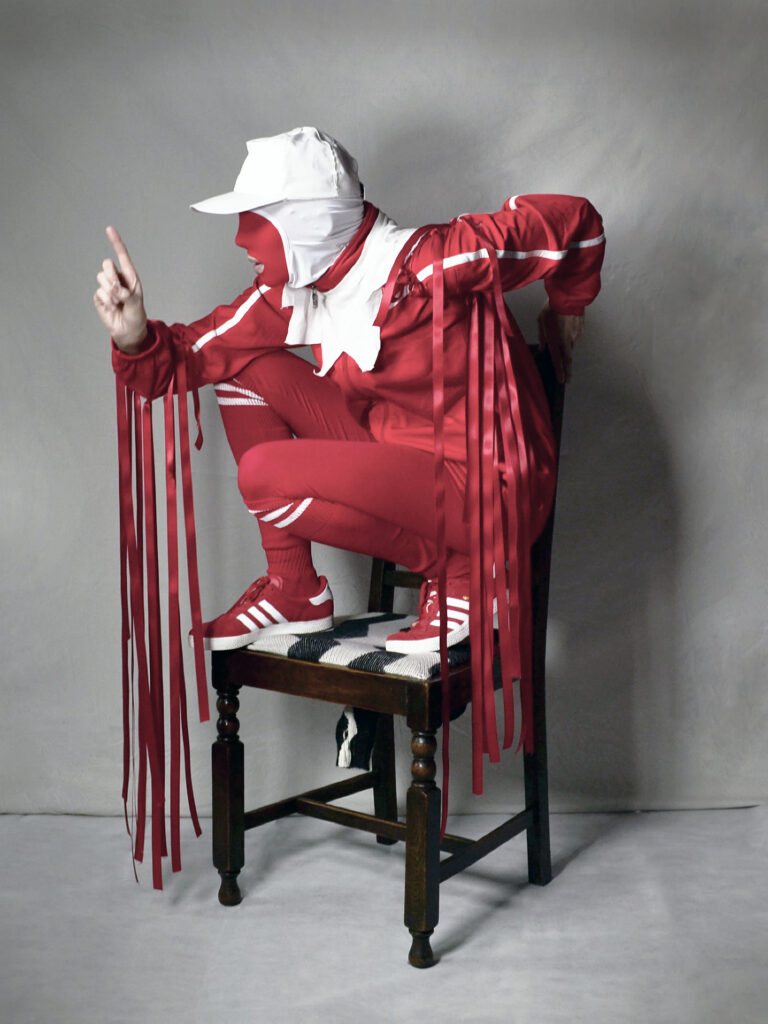
The dramatic persona that Bernholz created for ‘Pastoral’ is a sort of menacing court jester figure, half Mr Punch and half football hooligan, decked out in the lurid red-and-white colours of the St George’s Cross.
“It’s not a she or a he, and it’s not me, but it is multiple possible demons,” she says. “It was a perfect way to get across the madness and silliness of everything that’s going on, but also in a very traditional folk way.”
The red-and-white flag motif was partly inspired by JG Ballard’s final novel ‘Kingdom Come’, an apocalyptic fantasia of patriotic fascism and zombie consumerism. Bernholz had already composed an experimental stage musical based on the book, which Natalie Sharp (aka Lone Taxidermist) and Stuart Warwick toured in 2017 while she was at home being a new mother. But she felt the St George’s Cross design was worth revisiting, especially given its renewed post-Brexit resonance.
“Ballard predicted everything that’s going on,” says Bernholz. “That was swimming around my head, so I knew I wanted to use those colours, to have some kind of uniform. And then moving here, with the Brexit thing, I suddenly started to see St George’s flags everywhere. It just felt like a massive rise of interest in nationalist pride, and I can only ever see that in a negative light. However well-meaning some people are, that’s like a danger sign to me.”
Gazelle Twin have played a handful of ‘Pastoral’ live shows already, with more to follow in the autumn. But their performances can be bracingly brutal, unnerving affairs. Bernholz once listed audience reactions to her ‘Unflesh’ tour as “disdain, confusion, total fear, total aggression and confrontation”. Pure punk rock, in other words. But is this the kind of ear-bashing challenge that audiences really expect from an electronic artist?
“People can enjoy it on multiple levels,” she says, “whether or not they know the background behind what I’ve done. From when I made ‘Unflesh’, I knew I wanted to make records that would be enjoyable for me to perform live, and therefore would hopefully translate well and be enjoyable for an audience as well.”
Rewriting Jerusalem in England’s grim unpleasant lands, Gazelle Twin are the soundtrack to all your post-Brexit nightmares. Something wicked this way comes.
‘Pastoral’ is out on Anti-Ghost Moon Ray
